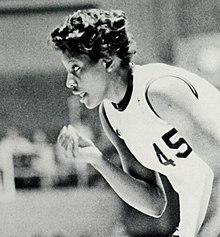
4 minute read
In the Classroom
Lusia Harris, ‘The Queen of Basketball’
By HERB BOYD
Special to the AmNews
Currently, basketball legend Lusia “Lucy” Harris is getting the attention she received in the mid-seventies when she began earning the title of “The Queen of Basketball,” a documentary produced by Shaquille O’Neal and Steph Curry. It has been nominated for Best Documentary Short at the 2022 Oscars and previously won the “Critics Choice Award for Best Documentary Short.
So, who was this Queen of Basketball, and why is she such a hot commodity in this season of March Madness? In one sense, this is a perfect time for her to regain the popularity she had during her record breaking years at Delta State College that paved the way for her to become the only woman ever officially drafted by the NBA.
Let’s start at the beginning or BH, before hoops. She was born Lusia Mae Harris Feb. 10, 1955, in Minter City, Mississippi to Willie and Ethel Harris, who worked as sharecroppers in cotton fields. The fourth of 11 children, she, like her siblings, all attended Amanda Elzy High School in Greenwood, Miss. Basketball was a common activity among the children, and a natural gravitation for Lusia as she starred for her school, captaining the team and becoming an all-state selection.
After graduation she had plans to attend Alcorn State University, but the school has no women’s basketball team. She was subsequently recruited by Melvin Hemphill to play at Delta State University in Cleveland, Miss., where Margaret Wade was the coach developing the team.
Almost from the moment she stepped on the court in 1973’74 wearing the uniform of the Lady Statesmen, she established her dominance, leading Delta to a 16-2 record. But that wasn’t good enough to get the team into the national tournament. The team acquired the ex-
perience and Lusia’s leadership the following year and qualified for the national tournament. In the championship game against the highly touted Mighty Mads of Immaculata University, Lusia scored 32 points and 18 rebounds in the team’s triumph. Each game that season witnessed a sterling performance as the team went undefeated and at the tournament she was named the most valuable player.
The next season, the two teams were once opponents in the national championship game. And once again Lusia led her team to victory, recording 30 points and 118 rebounds. She also led the nation in scoring with more than a thousand points or an average 31.2 points a game, including a phenomenal 58 against Tennessee Tech. Her senior year was no less spectacular as the team won a third championship before a large audience at Madi-
son Square Garden. Lusia charged 23 points and 16 rebounds in the defeat of Louisiana State University. Along with another tournament MVP she was named to the first All-American team. She finished her career with 2,981 points, 1,662 rebounds, and, quite expectedly, she held most of the school records for scoring and rebounding. In 1977, she was the first recipient of the Honda Sports Award for basketball as well as the Broderick Cup as the outstanding collegian female athlete.
It is rather ironic that Lusia, as the only Black player on the team, performed half of her games at the Walter Sillers Coliseum, named in tribute to an outspoken racist. And as we go to press that name has not been removed. The acclaim she compiled at Delta State was of equal importance to the U.S. national teams, particularly at the 1976 Olympic Games—a first for women—in which the team won a silver medal. This fell short of U.S. achievements at the PanAmerican Games in 1975, when with such stellar teammates as Ann Meyers and Pat Head, and high school phenom, Nancy Lieberman, in which they went unbeaten and earned the gold medal.
As a professional she was a member of the Houston Angels of the WBL (Women’s Professional Basketball League.) Also, at this time she became the first woman ever drafted by an NBA team. Later, she would be inducted to the Naismith Memorial Basketball Hall of Fame and the Women’s Basketball Hall of Fame.
After being drafted to play in the NBA, becoming the first after the first was voided, she declined to play for the San Francisco Warriors because she was pregnant and thus unable to attend the team’s training camp. Her professional career in the WBL was very brief without the distinguished accomplishments of college days. She earned a master’s degree in education at Delta State in 1984 where she worked as an admission’s counselor and assistant basketball coach. Later, she would be the head coach at Texas Southern University for two years and then returned to Mississippi for various assignments and jobs at her alma mater Amanda Elzy High School. In 1977, she married George E. Steward and they had four children, two sons and twin daughters.
Lusia died at a therapy facility in Mound Bayou Jan. 18, 2022, less than a month before her 67th birthday.
Lusia “Lucy” Harris
ACTIVITIES
FIND OUT MORE Besides Helen Wheelock’s informative profile, archived at the Women’s Sports Foundation, a number of books on women in athletics recount her remarkable basketball career.
DISCUSSION
Not much is said here about the racism she encountered as a player on an all-white team from Mississippi, and it’s hard to believe it didn’t bother her from time to time.
PLACE IN CONTEXT
Lucy, as she was often known, came of age in Mississippi, and was born there the same year Emmett Till was lynched.
THIS WEEK IN BLACK HISTORY
March 13, 2004: Tennis star Coco Gauff was born in Atlanta.
March 14, 1821: African Methodist Episcopal Zion Church Church was founded in New York.
March 15, 1827: Freedom’s Journal, the first African American newspaper, was published by John Russwurm and Samuel Cornish in Brooklyn.











